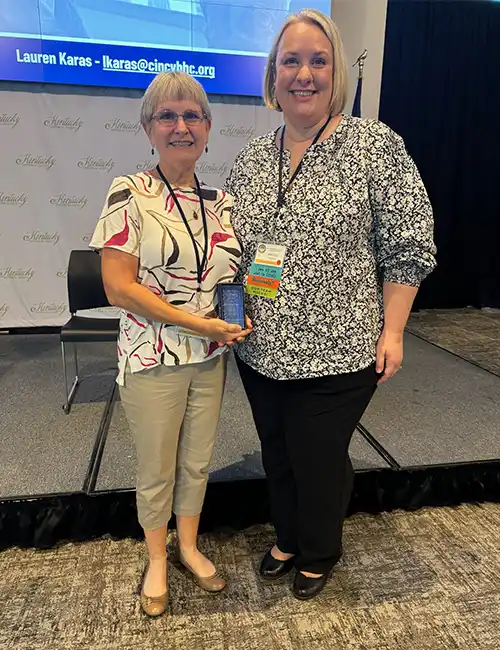Dr. Kimberlee Sharp wins Meece Award for Excellence in Social Studies Education


Morehead State Professor Recognized for Excellence in Social Studies Education

The Kentucky Council for Social Studies (KCSS) recently awarded Dr. Kimberlee Sharp, Professor of Teacher Education at Morehead State University, with the prestigious Meece Award for Excellence in Social Studies Education. The award was presented at the annual KCSS conference held in July.
Recognizing Excellence in Social Studies Education
The Meece Award is the highest honor bestowed by KCSS and celebrates outstanding achievements in social studies education in Kentucky. The award takes into account various qualities, including:
- Contributions to history, geography, economics, and civic education in Kentucky
- Supporting the advancement of social studies curriculum and instruction
- Going above and beyond to support social studies education
“We are thrilled to acknowledge Dr. Sharp’s exceptional work in the field of social studies,” said Kim Sargent, president of KCSS. “Her contributions to the content area and the teaching profession have been invaluable. She is truly deserving of this esteemed recognition.”
Advocating for Social Studies Education
Dr. Sharp has been a dedicated faculty member at Morehead State University for 20 years. She has held positions as an assistant professor (2005-2010) and associate professor (2011-2018) before assuming her current role in 2019. With a specialization in elementary and middle grade social studies education, Dr. Sharp emphasizes the importance of equipping college students to effectively educate young learners in social studies.
“Social studies education is the ‘heartbeat’ of the school curriculum,” Sharp explained. “It teaches students, from kindergarten through college, how to be active and engaged citizens in a diverse and democratic society. Our subject empowers students to participate in their communities, discover and utilize their political voices in meaningful and constitutionally protected ways, and understand the impact their voice and vote have on our government. In essence, social studies prepares students for civic life.”
Contact Information
For further information or inquiries, please contact Dr. Kimberlee Sharp at k.sharp@moreheadstate.edu or 606-783-2853.
To learn more about Morehead State University’s Ernst & Sara Lane Volgenau College of Education and its programs, please call 606-783-2162 or email ad.miller@moreheadstate.edu.
Photo, left to right: Dr. Kimberlee Sharp receiving the Meece Award for Excellence in Social Studies Education from KCSS President Rebecca Ingram.
SDGs, Targets, and Indicators
| SDGs | Targets | Indicators |
|---|---|---|
| SDG 4: Quality Education | 4.7: By 2030, ensure that all learners acquire the knowledge and skills needed to promote sustainable development, including, among others, through education for sustainable development and sustainable lifestyles, human rights, gender equality, promotion of a culture of peace and non-violence, global citizenship and appreciation of cultural diversity and of culture’s contribution to sustainable development | Indicator not mentioned in the article |
| SDG 16: Peace, Justice, and Strong Institutions | 16.7: Ensure responsive, inclusive, participatory and representative decision-making at all levels | Indicator not mentioned in the article |
1. Which SDGs are addressed or connected to the issues highlighted in the article?
The issues highlighted in the article are connected to SDG 4: Quality Education and SDG 16: Peace, Justice, and Strong Institutions.
2. What specific targets under those SDGs can be identified based on the article’s content?
Based on the article’s content, the specific target under SDG 4: Quality Education that can be identified is Target 4.7: By 2030, ensure that all learners acquire the knowledge and skills needed to promote sustainable development, including, among others, through education for sustainable development and sustainable lifestyles, human rights, gender equality, promotion of a culture of peace and non-violence, global citizenship and appreciation of cultural diversity and of culture’s contribution to sustainable development.
There is no specific target mentioned in the article that directly relates to SDG 16: Peace, Justice, and Strong Institutions.
3. Are there any indicators mentioned or implied in the article that can be used to measure progress towards the identified targets?
No indicators are mentioned or implied in the article that can be used to measure progress towards the identified targets.
4. SDGs, Targets, and Indicators
| SDGs | Targets | Indicators |
|---|---|---|
| SDG 4: Quality Education | 4.7: By 2030, ensure that all learners acquire the knowledge and skills needed to promote sustainable development, including, among others, through education for sustainable development and sustainable lifestyles, human rights, gender equality, promotion of a culture of peace and non-violence, global citizenship and appreciation of cultural diversity and of culture’s contribution to sustainable development | Indicator not mentioned in the article |
| SDG 16: Peace, Justice, and Strong Institutions | 16.7: Ensure responsive, inclusive, participatory and representative decision-making at all levels | Indicator not mentioned in the article |
Source: moreheadstate.edu








